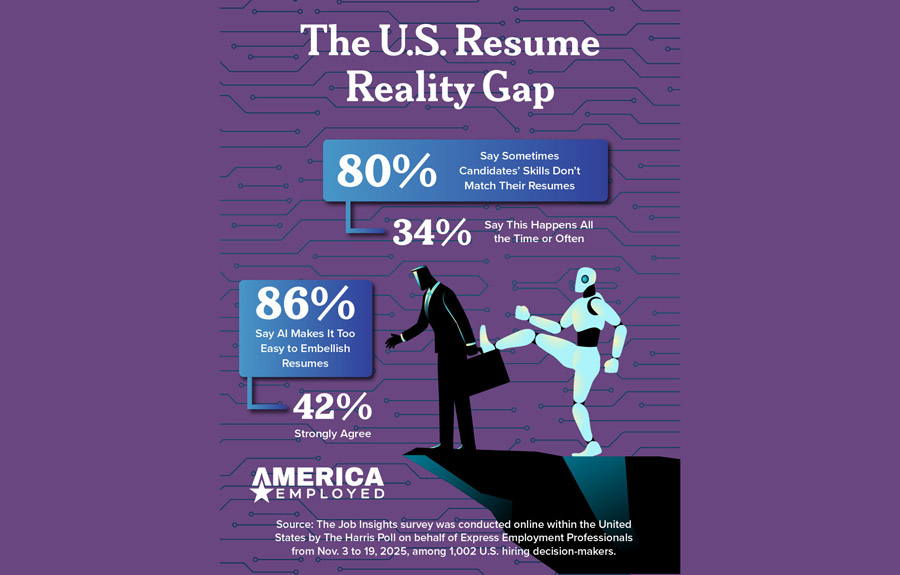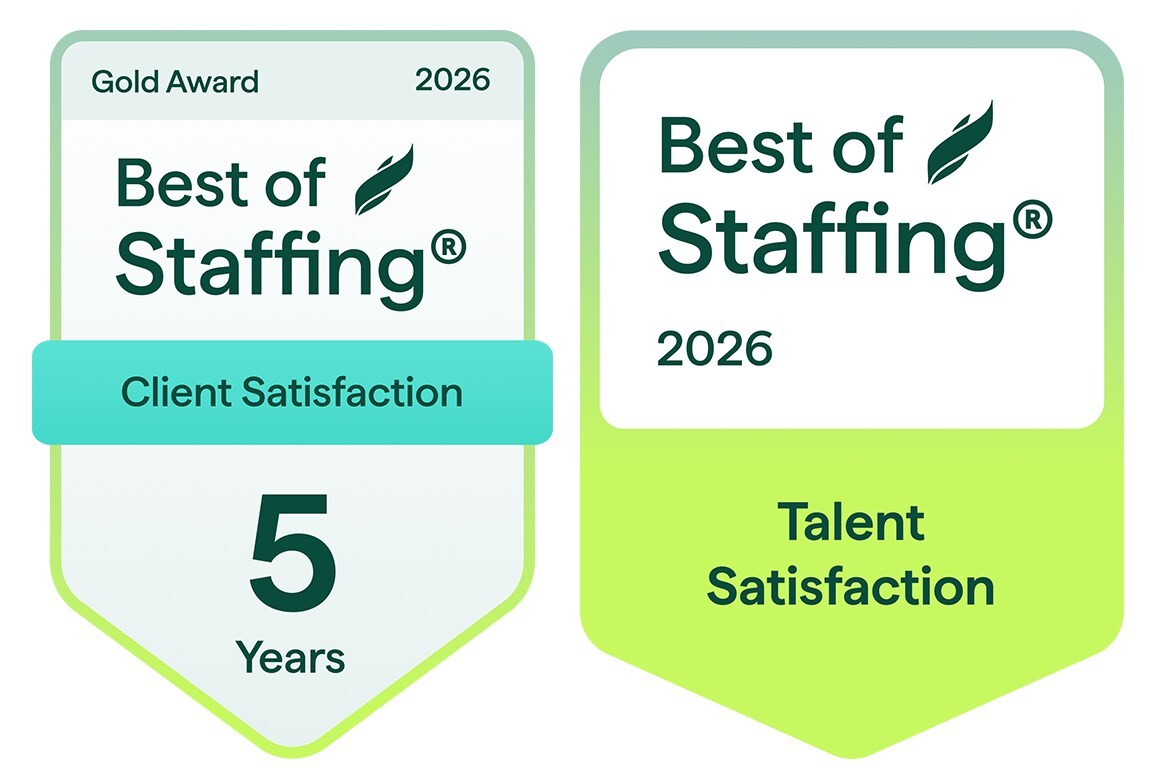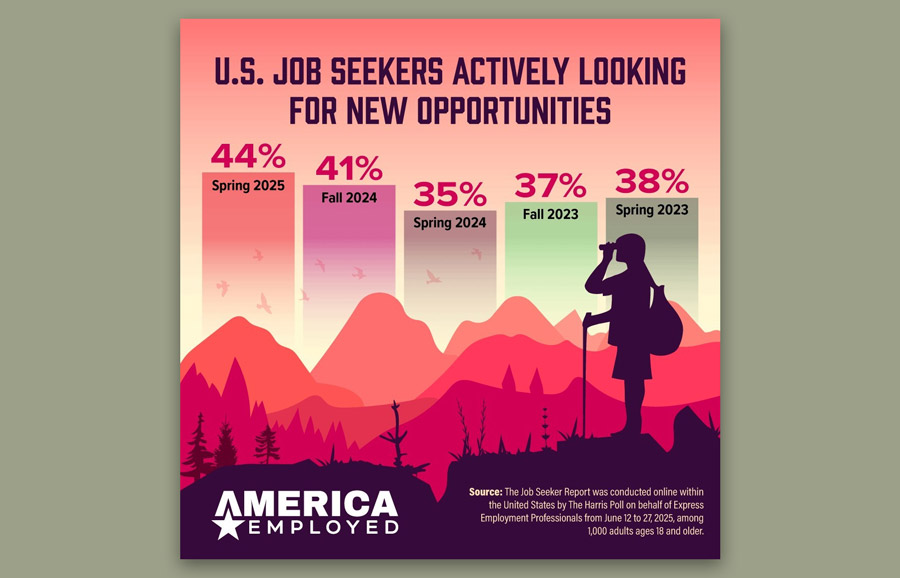86% of US Hiring Managers Say AI Makes It Too Easy to Exaggerate Skills on Resumes
From “Excel experts” who freeze at a simple formula to “chefs” who can’t chop onions, employers say exaggerated skills are showing up more than ever.
OKLAHOMA CITY — A new Express Employment Professionals-Harris Poll reveals a startling truth about today’s hiring landscape: job seekers may be stretching the truth on their resumes far more than they admit — and employers say they can spot the exaggerations a mile away.
According to U.S. hiring managers, 80% say candidates’ resumes don’t match their real-world skills at least sometimes, with 34% reporting it happens all the time or often.
Meanwhile, just 22% of job seekers confess to listing skills they don’t actually have; a gap raising major red flags for employers.
And now, with AI at every applicant’s fingertips, companies are sounding the alarm. Eighty-six percent of hiring managers believe AI makes it too easy to embellish resumes, and 42% strongly agree it’s becoming a serious hiring risk.
Wild Resume Claims? Hiring Managers Have Seen It All
Employers shared some of their most jaw-dropping experiences when a candidate’s “expertise” evaporated the moment they stepped into the job:
- A self-proclaimed forklift operator who crashed and took out an entire shelf on day one.
- A “chef” who couldn’t cut onions.
- A VP candidate who listed 10 years of experience — without being old enough to have 10 years of experience.
- A new hire who claimed proficiency with a POS system but froze at the screen like it was written in an ancient language, leading to same-day dismissal.
- A kitchen lead who walked out by noon because they didn’t know how to do any of the tasks they claimed they could do.
- A candidate who boasted “exceptional” negotiation skills but fell apart in a de-escalation role‑play, immediately offering a full refund without attempting to solve the problem.
- Another who touted strong communication skills, only for client meetings to quickly prove otherwise.
Job seekers themselves admitted to resume creativity, too — including pretending to be a licensed plumber, a data security expert, an advanced Excel wizard and even listing Google Analytics expertise without knowing what it was.
“In today’s market, you don’t need a perfect resume; you need a truthful one,” said Bob Funk Jr., CEO, President and Chairman of Express Employment International. “When job seekers exaggerate their abilities, they set themselves up for stress, failure and lost opportunities. But when they’re transparent about their skills and what they know, and eager to learn what they don’t, employers take notice. Integrity is still a competitive advantage.”
Discover more research and real-world workforce trends from the America Employed series at ExpressPros.com/Newsroom.
Survey Methodology
The Job Insights survey was conducted online within the United States by The Harris Poll on behalf of Express Employment Professionals from Nov. 3 to 19, 2025, among 1,002 U.S. hiring decision-makers.
The Job Seeker Report was conducted online within the United States by The Harris Poll on behalf of Express Employment Professionals from Nov. 7 to 20, 2025, among 1,003 adults ages 18 and older.
For full survey methodologies, please contact Sheena.Hollander@ExpressPros.com, Director of Corporate Communications & PR.
If you would like to arrange for an interview to discuss this topic, please contact Sheena.Hollander@ExpressPros.com, Director of Corporate Communications & PR.

About Robert (Bob) Funk Jr.
Robert (Bob) Funk Jr. is the Chief Executive Officer, President and Chairman of Express Employment International, a global staffing franchisor founded and headquartered in Oklahoma City, Oklahoma. He leads a portfolio of workforce solution brands, including the flagship Express Employment Professionals franchise, along with several affiliated brands serving specialized markets. The Express franchise brand is an industry-leading, international staffing company with franchise locations across the U.S., Canada, South Africa, Australia and New Zealand.
About Express Employment Professionals
At Express Employment Professionals, we’re in the business of people. From job seekers to client companies, Express helps people thrive and businesses grow. Our international network of franchises offers localized staffing solutions to the communities they serve across the U.S., Canada, South Africa, Australia and New Zealand, employing more than 11 million people globally since its inception. For more information, visit ExpressPros.com.










